"Don't touch that limbo bar!
You'll be a limbo star!
How low can you go?"--
Sly Stone wanted to take us higher.
Johnny Cash walks the line.
Chubby Checker asked "'how low can you go",
singing the classic crossover carribean rock and roll tune I heard on the scribbled over 45 rpm record one of my parents bought probably when they themselves were teenagers. I was not yet teen-aged. I was much lower than bar 13. And the limbo seemed an athletic dance where unlike the pole-vault, the high-bar jump, the aim was to go to the other extreme, to get down, go backwards. I may have wondered back then why the limbo bar was not featured in the Olympics because I tried it and it was no mean feat. This word "limbo" also being very Catholic = the interzone on the margins of hell, a holding cell where defunct unbapitized children wound-up on the outskirts of Dante's Inferno, waiting until the end times -- this word also caused strange feelings, despair, anxiety of birthright. This was long before I learned that the limbo dance was something carried over from the slave-ships where the African had to get into tight places for transport or become defunct, although doubtless some decided that it might be just as well to fall and splinter into salty sea or hummus right there. While others took the chance, ducked under, into the holds, cramped, bleeding, waiting to get to the other side. This was the challenge, the death-trip, the no-bullshit ritual passage to another life, a chance to escape. Life must have seemed sweet and worth the effort. Many did bend over backwards and survived to tell their tales. Somewhere the African survivors became Carribeans and memorialized their endurance feat in a dance, this dance of the inverted yogi, a lean behind the center of ventral gravity, into horizontal catabasis, and far below the average norms of those supermen who aimed for the verticality of stars and vagrant heavens. And yet it was a feat of acrobatic depth and concern, fitting with the themes which the German philosopher with the Dutch name, Peter Sloterdijk, speaks about at some length -- 600 or more pages -- I believe -- in his tome with the title ripped from Rilke's Archaic Torso poem, YOU MUST CHANGE YOUR LIFE. He sought to explain our obsession with sports, training, coaches, capitalism and competion, dieting, excersise, fitness by the concept of ANTHROPOTECHNICS. The straight and narrow. The line we all walk or simulate in order to get the job.
We are led in this century, according to Sloterdijk, into regimes of discipline, self-regulation, asceticism and he explains in a familiar Nietzschean slalom how we adopted or carried these regimes over from the dynamics described in the Genaology of Morals and other books we have forgotten about since those times began when mentioning Nietzsche was tantamount to endorsing various fascisms. My personal view is that our fascisms are in our sporting facilities, our police, quite often in our music, academies, our heavy metals, our pavement. But looking more carefully we can see it in our literature and in every competitive, exceptionalist endeavor of human beings whose lack of existential groundedness results in their own desires to lord it over other species, enslave minorities, reduce competitors to dust and ruin the planetary balance that supports life itself. Ooooops. You raving genome of indeterminate evolutionary origin, you did it again.
Here are some passages from Slojterdijk's magnum opus in the translations I have from Wieland Hoban (mentioned in this blog as the live acrobatic translator of Helmut Lachenmann) http://transparent-abelard.blogspot.com/2019/12/art-is-broken-form-of-magic-on-margins.html
"In his case, the dawn of the acrobats is already several degrees brighter and clearer, which is why one can make out the scenery in something close to daylight. There is no need to explain in detail here that Kafka was an advocate of gymnastic exercises, vegetarian diets and ideologies of hygiene that were typical of the time. In the collection of statements he excerpted from his octavo notebooks and arranged in a numbered list (later edited and published by Max Brod under the title Betrachtungen uher Sunde, Leid, Hoffnung und den wahren Weg [Observations on Sin, Suffering, Hope and theTrue Path]), the first entry reads:
The true path is along a rope, not a rope suspended way up in the air, but rather only just over the ground. It seems more like a tripwire than a tightrope.
The rope can only function as a metaphor for acrobatism if one imagines it stretched out; one must therefore pay attention to the sources of tension, its anchors and its modalities of power transfer. As long as the rope's tension was produced with metaphysical intentions, one had to suppose the existence of a pull from the world above to explain its particular form of intensity. Ordinary existence came into contact with this pull from above through the ubiquitous example of the saints, who, owing to efforts that people liked to term superhuman, were occasionally permitted to approach the impossible. We must not forget that superhomo is an arch-Christian word in which the high Middle Ages uttered its most intense concern - it was first used for the French king St Louis IX in the late thirteenth century! The exhaustion of such an otherworldly pole becomes most apparent in the fact that ever fewer people strive to walk the tightrope
"In his case, the dawn of the acrobats is already several degrees brighter and clearer, which is why one can make out the scenery in something close to daylight. There is no need to explain in detail here that Kafka was an advocate of gymnastic exercises, vegetarian diets and ideologies of hygiene that were typical of the time. In the collection of statements he excerpted from his octavo notebooks and arranged in a numbered list (later edited and published by Max Brod under the title Betrachtungen uher Sunde, Leid, Hoffnung und den wahren Weg [Observations on Sin, Suffering, Hope and theTrue Path]), the first entry reads:
The true path is along a rope, not a rope suspended way up in the air, but rather only just over the ground. It seems more like a tripwire than a tightrope.
The rope can only function as a metaphor for acrobatism if one imagines it stretched out; one must therefore pay attention to the sources of tension, its anchors and its modalities of power transfer. As long as the rope's tension was produced with metaphysical intentions, one had to suppose the existence of a pull from the world above to explain its particular form of intensity. Ordinary existence came into contact with this pull from above through the ubiquitous example of the saints, who, owing to efforts that people liked to term superhuman, were occasionally permitted to approach the impossible. We must not forget that superhomo is an arch-Christian word in which the high Middle Ages uttered its most intense concern - it was first used for the French king St Louis IX in the late thirteenth century! The exhaustion of such an otherworldly pole becomes most apparent in the fact that ever fewer people strive to walk the tightrope
Existence as such is an acrobatic achievement, and no one can say with certainty what training provides the necessary skills to master this discipline. Hence the acrobat no longer knows what exercises keep him from falling - aside from constant vigilance.This fading level of artistedom by no means indicates a loss of this phenomenon's significance; on the contrary, it reveals how aspects of the artiste spread to affect all aspects of life. The great subject of the arts and philosophies of the twentieth century - the discovery of the ordinary - draws its energy from the dawn of the acrobats, which ensues in parallel with it. It is only because the esotericism of our time exposes the equivalence of ordinariness and acrobatics that its investigations produce non-trivial results."
In these few passages I merely draw attention to the dynamic of stumbling. In Kafka's world it seems clear that many strivings are doomed from the outset as Promethean (the problem of the Titans, as the paleo-Luciferians, is vast and the tragedy of this class struggle is well expressed in Pavese's Dialoghi con Leuco https://sysprv.com/leuco.html), as the result of Babelic over-reaching. Kafka describes it however typically as tragi-comic. The tight-rope, like the limbo bar, the parallel bars, are set in absurdly variable proportions of relativistic distantiation. The distances correspond to the continually changing levels of judgment, paradox, double-standard, ficklenes and hypocisy we see in our value systems. Don't be too high falultin' in your speech; don't use 50 cent or 50 dollar words. Don't dumb down your discourse. Don't offend anyone. Don't be scared to alienate. Don't be a coward. Don't speak out of turn. Stop virtue signalling. Know your place in the world. Speak truth to power. We are all given these impossible tasks to achieve, we are asked to achieve them by those who most likely did not and cannot succeed themselves. We have to make something of ourselves. Don't be too ambitious. You are even asked not to take yourself so damn seriously. But when you are too non-chalant, you will ge the hammer for being obscure, chastized for not "living up to your potential" -- as if anyone really understands "potential" outside of market concerns. We live daily in a world of climate catastrophe, world leaders of lies and subterfuge, petty control freaks. Maybe the truth is that you should not change your life at all but just attain to consciousness of what it means to be alive. Just have a good time and don't muck it up for other creatures who have the same rights to this life as you, whether they resemble you or not, whether you see them or not.
Stumble and be happy. What you stumbled over is another form of life. It likely preceded you by millions of years. Rejoice and tread lightly. Share the insight.
And let's twist again
And let's twist again

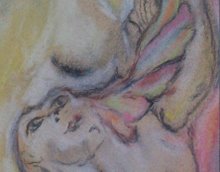



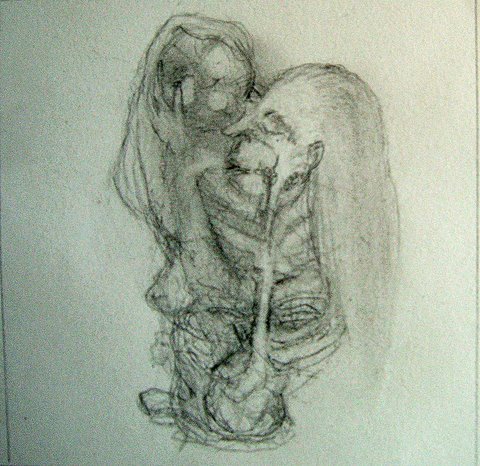
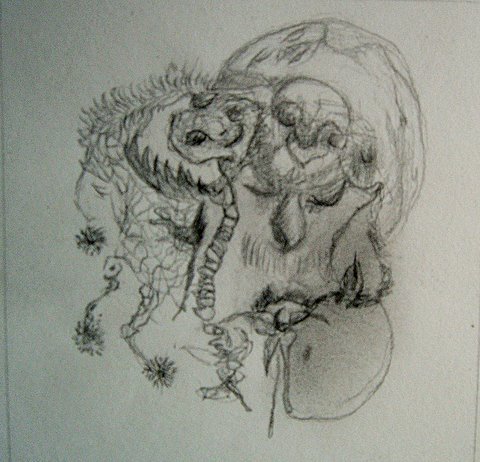
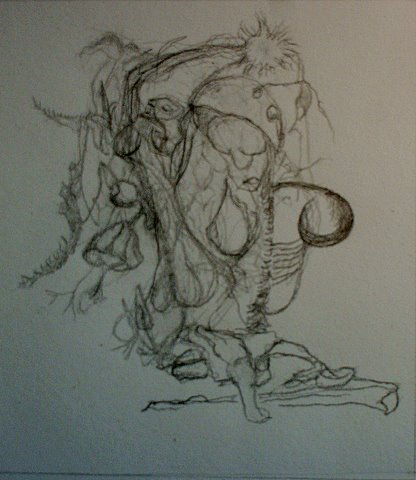
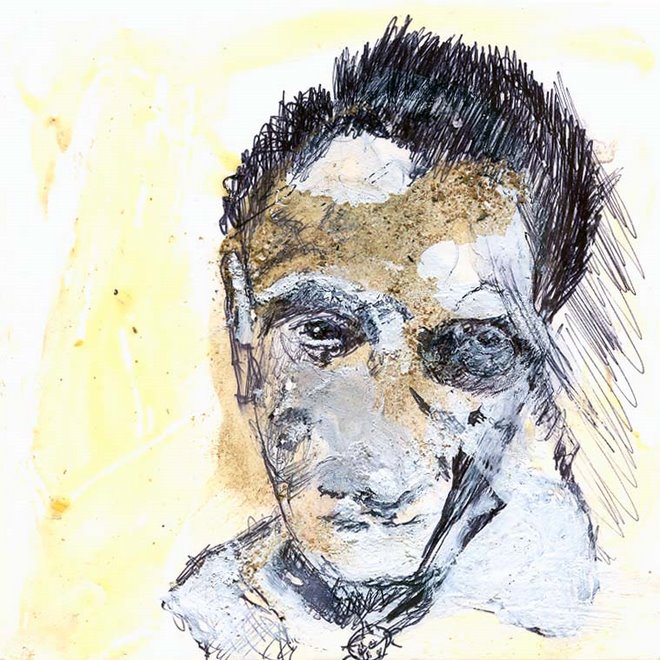
No comments:
Post a Comment